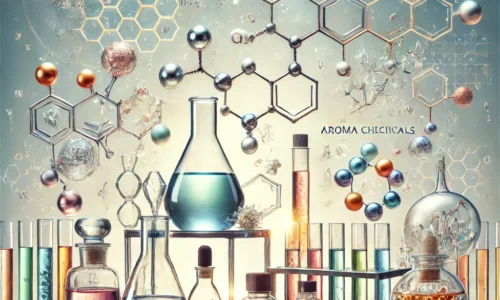Course Overview:
Perfume creation is both an art and a science, requiring a deep understanding of the ingredients that make up a fragrance. This course, Mastering Aroma Chemicals – A Comprehensive Guide to Perfumery Ingredients, is designed for aspiring perfumers, fragrance formulators, cosmetic chemists, and anyone passionate about the world of scents.
You will explore synthetic and natural aroma chemicals, learning their olfactory characteristics, chemical properties, and how they interact in perfume compositions. The course covers practical blending techniques, formulation strategies, and real-world applications, allowing you to confidently create your own fragrances using a structured and scientific approach.
Through detailed modules, practical examples, and formulation exercises, you will gain the knowledge needed to enhance fragrance longevity, balance scent accords, and replicate natural aromas using synthetic substitutes. Whether you are a beginner or an intermediate-level perfumer, this course will provide essential insights into modern perfumery techniques.
Why is Learning Aroma Chemicals Important for a Perfumer?
🔹 1. Understanding the Building Blocks of Fragrance
A perfume is much more than just a blend of essential oils. It consists of complex chemical compounds that contribute to scent development, diffusion, and longevity. Learning about aroma chemicals allows a perfumer to:
- Recognize and use key fragrance molecules.
- Replicate and modify natural scents using synthetic alternatives.
- Enhance and fine-tune perfume compositions with greater precision.
🔹 2. Creating Unique and Long-Lasting Fragrances
Aroma chemicals help in extending the longevity of perfumes. Synthetic musk compounds, fixatives, and aldehydes stabilize fragrances and prevent rapid evaporation. Mastering these ingredients ensures:
- Balanced top, middle, and base notes for a smooth transition in fragrance evolution.
- Improved fragrance projection and silage (the trail a perfume leaves behind).
- Consistent performance across different formulations.
🔹 3. Expanding Creative Possibilities
Natural extracts have supply limitations and cost constraints, whereas synthetic aroma chemicals allow perfumers to:
- Recreate rare or restricted ingredients (e.g., oakmoss, ambergris) using synthetic alternatives.
- Modify and enhance scent profiles without relying solely on essential oils.
- Develop signature scents with modern and innovative compositions.
🔹 4. Compliance with Industry Regulations
The perfume industry follows strict regulations such as IFRA (International Fragrance Association) guidelines to ensure consumer safety. By learning about synthetic aroma chemicals, a perfumer can:
- Work within regulatory restrictions and replace banned ingredients with safe alternatives.
- Formulate skin-safe and allergen-free perfumes for commercial use.
- Understand environmental sustainability and use eco-friendly fragrance materials.
🔹 5. Practical Application in Commercial Perfumery
Most commercial perfumes use a high percentage of synthetic aroma chemicals to maintain stability, cost efficiency, and consistent quality. Mastering aroma chemicals allows perfumers to:
- Develop professional-grade perfumes that are market-ready.
- Understand the role of synthetic ingredients in fine fragrances, cosmetics, and functional products (soaps, candles, detergents).
- Enhance fragrance customization based on consumer preferences and trends.
What You Will Learn in This Course?
✅ Introduction to Aroma Chemicals – What they are and how they are used in perfumery.
✅ Classification of Aroma Chemicals – Complete list with scent descriptions and applications.
✅ How to Blend and Balance Synthetic and Natural Ingredients – Practical formulation techniques.
✅ Creating Perfume Accords Using Aroma Chemicals – Citrus, floral, woody, musk, and gourmand notes.
✅ Longevity and Stability in Fragrance Formulation – Fixatives and stabilizers.
✅ Regulatory and Safety Guidelines – IFRA standards and allergen considerations.
✅ Hands-on Practical Exercises – Experimenting with aroma chemicals in real formulations.
Who Should Take This Course?
🔹 Aspiring Perfumers – Learn to craft signature fragrances with professional techniques.
🔹 Cosmetic Chemists & Formulators – Gain insights into aroma chemicals used in cosmetics and skincare.
🔹 Entrepreneurs & Indie Perfumers – Create your own brand of perfumes and scented products.
🔹 Fragrance Enthusiasts – Deepen your knowledge of synthetic and natural fragrance compounds.
Final Thoughts
Mastering aroma chemicals is essential for creating high-quality, stable, and unique fragrances. Whether you dream of becoming a professional perfumer or simply wish to experiment with fragrance creation, this course will equip you with the technical skills and creative knowledge to excel in the world of modern perfumery.
Are you ready to unlock the secrets of scent chemistry and elevate your fragrance-making skills? 🚀✨
Curriculum
- 8 Sections
- 36 Lessons
- 10 Weeks
- Module 1: Introduction to Aroma Chemicals5
- 1.11.1 Understanding the Role of Aroma Chemicals in Perfumery
- 1.21.2 Natural vs. Synthetic Ingredients: Differences & Benefits
- 1.31.3 Essential Chemistry: Functional Groups & Molecular Structure in Fragrance Compounds
- 1.41.4 Safety & Regulatory Considerations in Using Aroma Chemicals
- 1.5Practical Example Module 1:
- Module 2: Classification of Aroma Chemicals8
- 2.12.1 Terpenes & Terpenoids (e.g., Limonene, Linalool)
- 2.22.2 Aldehydes & Their Impact on Freshness (e.g., Citral, Decanal)
- 2.32.3 Esters: Fruity & Sweet Notes (e.g., Ethyl Butyrate, Methyl Anthranilate)
- 2.42.4 Ketones in Perfumery (e.g., Ionones, Muscone)
- 2.52.5 Lactones & Their Creamy, Milky Profiles (e.g., Peach Lactone, Coumarin)
- 2.62.6 Nitrogen & Sulfur Compounds in Fragrance (e.g., Indole, Mercaptans)
- 2.72.7 Aromatic Compounds (e.g., Vanillin, Anisaldehyde)
- 2.8Practical Example Module 2:
- Module 3: Synthetic Musks & Fixatives4
- Module 4: Solvents & Carriers in Aroma Chemical Applications4
- Module 5: Blending Techniques with Aroma Chemicals5
- Module 6: Practical Applications in Perfumery5
- Module 7: Advanced Techniques & Industry Insights4
- Final Project:1
Instructor
